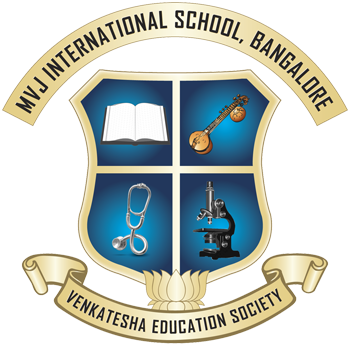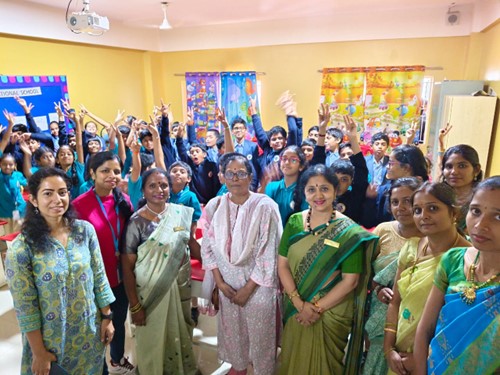On September 24, 2024, MVJ International School hosted an informative session on child safety, led by the Amazon team represented by Sudhamani and Shivani Preti. The event aimed to raise awareness about child protection, with a special focus on India's Protection of Children from Sexual Offences Act (POCSO). The session was opened with a warm welcome from our honourable Principal mam Ms. Vamsheepriya Amar , who introduced the Amazon team to the students and staff of Grades IV–X.

Principal of MVJIS is introducing the AMAZON team
1. Introduction to Child Safety
Child safety is a global concern centered on protecting children from abuse, neglect, exploitation, and harm. The speakers highlighted that ensuring child safety involves creating secure environments where children can thrive without facing threats to their physical and emotional well-being. Governments and organizations worldwide are committed to upholding child safety by implementing various legal frameworks to safeguard children’s rights and promote their overall welfare.
2. Key Highlights from the Amazon Team on Child Safety

The Amazon team shared their insights on the importance of child safety, emphasizing that a safe environment is critical for a child's mental, emotional, and physical well-being. They highlighted the following key reasons for prioritizing child safety:
- Protection from Abuse and Neglect: Children are vulnerable to physical, sexual, emotional abuse, and neglect. Ensuring their safety protects them from these harms.
- Promoting Healthy Development: A safe and nurturing environment fosters positive mental, emotional, and physical development.
- Legal and Ethical Responsibility: Societies have a moral and legal duty to protect children and ensure their healthy development.
- Myths and Stereotypes about Child Abuse: The speakers also addressed common misconceptions about child abuse, encouraging students to be aware and to challenge harmful stereotypes.
3. Overview of Key Child Safety Acts

The session provided an overview of important global and national child safety acts. Notable among them are:
- United Nations Convention on the Rights of the Child (UNCRC):
Adopted in 1989, this human rights treaty outlines the civil, political, economic, social, and cultural rights of children. It emphasizes the protection of children from abuse, exploitation, and neglect.
- Protection of Children from Sexual Offences Act (POCSO), 2012 (India):
This act provides comprehensive protection for children under 18 from sexual abuse, harassment, and pornography. It mandates child-friendly procedures during investigations and trials while laying down stringent penalties for offenders.
4. Challenges in Implementing Child Safety Laws
Despite the presence of robust child protection laws, several challenges impede their effective implementation. These include:
- Lack of Awareness: Many communities lack awareness about child protection laws, leading to underreporting of abuse cases.
- Resource Constraints: Limited resources, including funding and trained personnel, affect the enforcement of child protection measures.
- Cultural and Social Barriers: Cultural norms and stigma in some regions can obstruct the recognition and reporting of child abuse.
- Judicial Delays: Prolonged legal processes often delay justice for child victims, undermining the intended protections offered by laws.
5. Recommendations for Enhancing Child Safety
To overcome these challenges, the speakers offered the following recommendations:
- Enhanced Awareness Campaigns: Educating communities about child rights and safety laws empowers individuals to recognize and report abuse.
- Strengthening Reporting Mechanisms: Establishing accessible and confidential child-friendly reporting channels can encourage timely reporting of abuse.
- Training Law Enforcement and Judicial Personnel: Specialized training for those involved in handling child protection cases ensures more effective legal proceedings and support for victims.
- Support Services for Victims: Expanding rehabilitation, counseling, and support services for child victims aids in their recovery and reintegration into society.
The team also introduced the students to Child Safety Helpline: 1098, which provides immediate assistance for children in distress.
6. Conclusion
The event concluded with a powerful message that child safety is an essential aspect of building a just and humane society. While legal frameworks like POCSO are in place, their effective implementation requires the collective effort of governments, organizations, communities, and individuals. By raising awareness, strengthening legal structures, and providing better support systems, we can ensure that children grow up in safe, nurturing environments, free from exploitation and harm.
The session was insightful, leaving students with a deeper understanding of the importance of child safety and the role each individual plays in protecting children.



